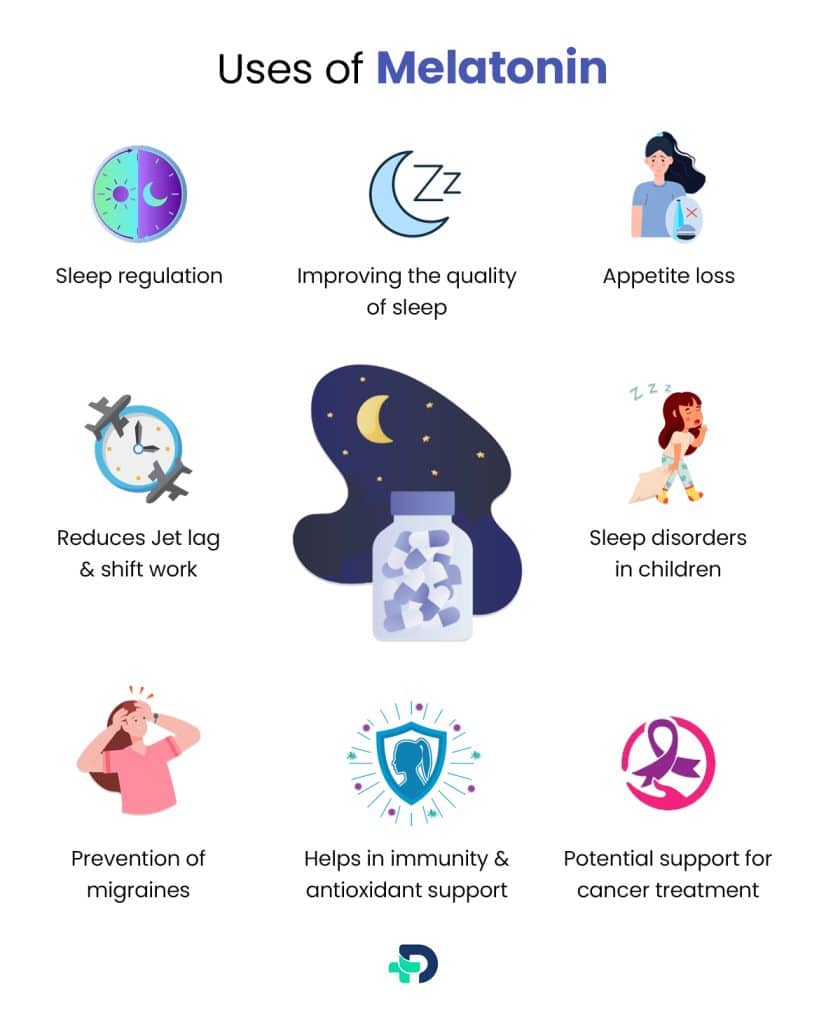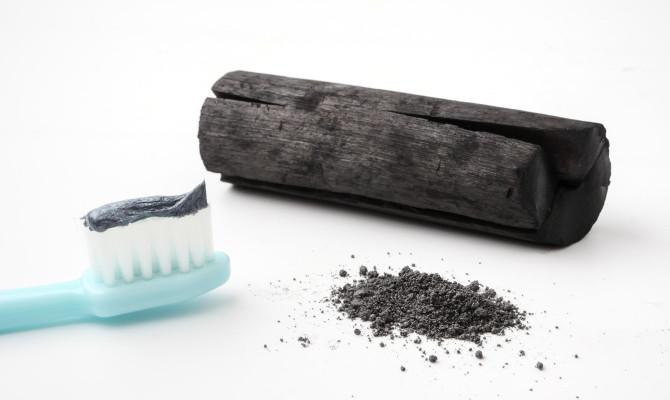Melatonin: Uses, Side effects and Precautions

- Melatonin
- 17 Aug 2023
Overview
What is Melatonin?
The body naturally produces the hormone melatonin. It has attracted a lot of interest as a well-liked sleep aid and a natural treatment for many sleep disorders.
Our total welfare is greatly influenced by sleep, which has an impact on everything from our emotions and cognitive abilities to our physical health. However, exactly what is melatonin and how does it affect our sleep-wake cycle are still unknown. We will explore the uses, advantages, and potential negative effects of melatonin in this article.1Overview| Researched based study from Nlm.nih.gov

Uses

Melatonin Uses
- Aids in sleep regulation
- Improving sleep quality
- Reduces discomfort of Jet lag and shift work
- Manages sleep disorders in children
- Works as antioxidant and in immune support
- Helps migraine prevention
- Supports potential cancer treatment
It has a range of uses and potential benefits. Here are some of the primary uses and applications1Uses| Researched based study from Nlm.nih.gov ,2Uses| Researched based study from Nlm.nih.gov
Sleep regulation
- It is important in controlling the circadian rhythm, often known as the sleep-wake cycle. It helps in letting the body know when to sleep and wake up. Melatonin medicine can be used to treat several sleep disorders, including jet lag, insomnia, shift work disorder, and sleep abnormalities brought on by diseases like sleep apnea or restless leg syndrome.
Improving the quality of sleep
- It has been shown to improve sleep quality by speeding up the process of falling asleep and lengthening the total amount of time spent sleeping. Additionally, it might make sleeping easier and encourage more restful sleep.
Reduces Jet lag and shift work
- Supplementing with melatonin can help reduce the effects of jet lag, a brief interruption of the sleep-wake cycle brought on by crossing multiple time zones. Additionally, it might be helpful for those who have irregular working hours or night shifts by helping them in modifying their sleep patterns to suit their needs.2Uses| Researched based study from Nlm.nih.gov
Helps in immunity and antioxidant support
- It may remove harmful free radicals and has antioxidant qualities, defending cells from oxidative stress. Additionally, it affects immune system modulation, possibly boosting immunological function and promoting overall immune health11Uses| Researched based study from Nlm.nih.gov
Sleep disorders in children
- Children with certain sleep disorders, such as delayed sleep phase disorder or sleep issues linked to attention deficit hyperactivity disorder (ADHD), may benefit from using it. It may improve overall sleep quality and help create regular sleep patterns.
Prevention of migraines
- Melatonin may lessen the frequency and severity of migraines or perhaps help avoid them. People with migraines brought on by snoring issues or circadian rhythm changes may find it very helpful.13Uses| Researched based study from Nlm.nih.gov
Potential support for cancer treatment
- It has been researched for its possible contribution to the treatment of cancer. According to research, it may improve some chemotherapy medications’ effectiveness, lessen their negative effects, and help restore circadian rhythms that have been disturbed by cancer or its therapies6Uses| Researched based study from Nlm.nih.gov
Side effects
Side effects of Melatonin
- Daytime drowsiness
- Altered sleep patterns
- Headache and dizziness
- Gastrointestinal issues
- Mood changes
- Hormonal effects
Melatonin is normally considered as safe for short-term usage, but it’s important to be aware of any possible adverse effects, even if they are usually small. Here are a few examples:3Side effects| Researched based study from Nlm.nih.gov ,4Side effects| Researched based study from Nlm.nih.gov
Drowsiness
- Taking melatonin can occasionally result in daytime sleepiness and grogginess, especially if the dosage is excessive or the timing is off. To reduce the chance of daytime sleepiness, it is advised to take it in the evening or right before bed.3Side effects| Researched based study from Nlm.nih.gov
Altered sleeping habits
- It may occasionally result in transient disruptions to sleep habits. This can involve disturbing the regular sleep cycle or having vivid dreams or nightmares. Once melatonin consumption is stopped, these symptoms normally subside temporarily4Side effects| Researched based study from Nlm.nih.gov
Headaches and dizziness
- As a side effect, some persons may feel lightheaded or headache. It is best to see a doctor if these symptoms appear.
Digestive disorders
- It occasionally produces digestive symptoms as nausea, diarrhea, or stomach pain. Usually, they are mild and transient.
Mood shifts
- Some people may have mood changes as a result, including feelings of irritation, despair, or worry. It’s crucial to visit a doctor if these symptoms worsen or continue3Side effects| Researched based study from Nlm.nih.gov
Effects of hormones
- Although the scope and importance of these impacts are still being investigated, it may potentially affect hormone levels. Although the therapeutic implications are not yet fully understood, it may have an impact on reproductive hormones such follicle-stimulating hormone and luteinizing hormone.10Side effects| Researched based study from Nlm.nih.gov
Production
When do Melatonin levels peak and why?
Particularly in the late evening and early morning, at night hours usually occur when they are at their peak. The precise time of secretion is determined by a person’s circadian rhythm and is impacted by outside variables like light exposure.
Evening
- Around nine or ten o’clock in the evening, melatonin production starts to increase. The decrease in light exposure as daylight becomes shorter causes this rise in secretion. Melatonin is released into the bloodstream by the brain’s gland in response to darkness.
Nighttime
- The levels climb throughout the night, peaking in the hours between 2 and 4 in the morning while people are sleeping. This concentration peak aids in sustaining and promoting sleep. 5Production| Researched based study from Nlm.nih.gov
What affects melatonin production?
- The natural production cycle can be hampered by external influences such artificial light, especially blue light emitted by gadgets and intense indoor lighting.
- Bright light exposure in the late afternoon or early evening can reduce melatonin production, delaying its peak and perhaps reducing the quality and ease of falling asleep.5Production| Researched based study from Nlm.nih.gov
Interactions
Melatonin interaction with medicines
Blood thinners and anticoagulants
- When combined with medications like heparin, warfarin, aspirin, or clopidogrel, it may make bleeding more likely. If you are using any blood thinners, it is crucial to speak with a healthcare provider.9Interactions| Researched based study from Nlm.nih.gov
Immunosuppressant
- It’s essential to use caution when combining it with immune system suppressants like corticosteroids or medications used after organ donation because it may have an impact on the immune system11Interactions| Researched based study from Nlm.nih.gov
Sedatives and benzodiazepines
- Melatonin may increase the sedative effects of benzodiazepines like diazepam, alprazolam, or other sedatives, which may result in excessive drowsiness. A doctor should be consulted before combining these medications7Interactions| Researched based study from Nlm.nih.gov
Blood pressure medications
- Some people’s blood pressure may be lowered by melatonin. As a result, it’s crucial to carefully monitor your blood pressure if you’re taking drugs to lower your blood pressure, such as beta blockers or calcium channel blockers8Interactions| Researched based study from Nlm.nih.gov
Hormone replacement therapy and contraception
- It might have an impact on hormone levels. Therefore, before starting melatonin supplementation, those utilizing hormonal contraception or hormone replacement therapy should speak with a healthcare provider.10Interactions| Researched based study from Nlm.nih.gov
Precautions
Warnings and precautions
A health condition
- It is wise to speak with a medical expert, especially if you have any underlying medical issues.
Timing and dosage
- Given that they come in a variety of strengths and forms, it is crucial to adhere to the dosage recommendations. The time of melatonin administration is also important. Melatonin can affect sleep-wake cycles if taken too early in the evening or too near to waking hours.
Individual sensitivity
- Due to differences in sensitivity, different people may react to melatonin in different ways. If more is needed, start with a smaller dose and gradually increase it.
Not a replacement for good sleeping habits
- Melatonin pills shouldn’t be used as a replacement for sound sleep hygiene routines and healthy sleep habits. Prioritizing things like keeping a regular sleep schedule, having a sleep-friendly atmosphere, minimizing exposure to electronics before bed, and controlling stress levels is crucial.
Use for a brief period and underlying reasons
- In general, short-term use is advised to address particular sleep-related disorders. if you often or continuously have sleep issues.1Precautions| Researched based study from Nlm.nih.gov
Any feedback on this article?
 This Articles content was accurate
This Articles content was accurate Very Informative Article
Very Informative Article I have a question or a comment
I have a question or a comment
 This article contains inaccurate content
This article contains inaccurate content This article was not helpful
This article was not helpful I have a question or a comment
I have a question or a comment
We appreciate your helpful feedback!
Checkout our social pages
References
-
National Library of Medicine
Melatonin | Overview
-
National Library of Medicine
Therapeutic applications of melatonin | Uses
-
National Library of Medicine
Benefits and adverse events of melatonin use in the elderly | Side effects
-
National Library of Medicine
Current Insights into the Risks of Using Melatonin as a Treatment for Sleep Disorders in Older Adults | Side effects
-
National Library of Medicine
Melatonin: Pharmacology, Functions and Therapeutic Benefits |
-
National Library of Medicine
Melatonin for the prevention and treatment of cancer | Uses
-
National Library of Medicine
Premedication with Oral Alprazolam and Combination: A Comparison with Either Alone—A Randomized Controlled Factorial Trial | Interactions
-
National Library of Medicine
Melatonin interactions with blood pressure and vascular function during L-NAME-induced hypertension | Interactions
-
National Library of Medicine
Current Insights into the Risks of Using Melatonin as a Treatment for Sleep Disorders in Older Adults | Interactions
-
National Library of Medicine
Interactions between melatonin and estrogen may regulate cerebrovascular function in women: clinical implications for the effective use of HRT during menopause and aging | Interactions
-
National Library of Medicine
Melatonin: Buffering the Immune System | Interactions
-
National Library of Medicine
The Therapeutic Potential of Melatonin: A Review of the Science | Precautions
-
National Library of Medicine
The Pathogenetic Role of Melatonin in Migraine and Its Theoretic Implications for Pharmacotherapy: A Brief Overview of the Research | Precautions





































